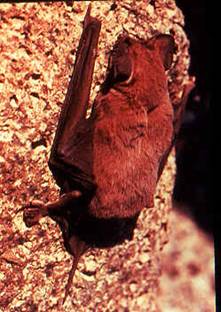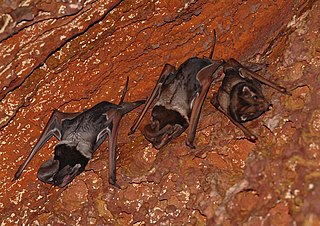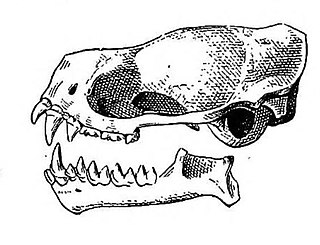| Promops | |
|---|---|
| Scientific classification | |
| Kingdom: | Animalia |
| Phylum: | Chordata |
| Class: | Mammalia |
| Order: | Chiroptera |
| Family: | Molossidae |
| Genus: | Promops Gervais, 1856 |
Promops is a genus of free-tailed bats. [1]
| Promops | |
|---|---|
| Scientific classification | |
| Kingdom: | Animalia |
| Phylum: | Chordata |
| Class: | Mammalia |
| Order: | Chiroptera |
| Family: | Molossidae |
| Genus: | Promops Gervais, 1856 |
Promops is a genus of free-tailed bats. [1]

The Molossidae, or free-tailed bats, are a family of bats within the order Chiroptera. The Molossidae is the fourth-largest family of bats, containing about 110 species as of 2012. They are generally quite robust, and consist of many strong-flying forms with relatively long and narrow wings with wrinkled lips shared through their genus. Their strong flying forms allows them to fly 60 miles per hour using tail winds and at altitudes over 10,000 feet. This makes them unique among bats, as they are the only bat family that withstands the elevation. They are widespread, being found on every continent except Antarctica. They are typically found in caves, abandoned mines, or tunnels.
The name mastiff bat is applied to certain species of the bat family Molossidae or so called free-tailed bats. It is usually applied specifically to the following genera:

The Colombian bonneted bat, also known as Trumbull's bonneted bat, is a bat species from South America. It is found in Bolivia, Brazil, Colombia, French Guiana, Guyana, Peru, Suriname and Venezuela.

The Bonda mastiff bat or Thomas's mastiff bat, is a species of mastiff bat from South and Central America. It is named for the town of Bonda, near Santa Marta in Colombia.

The black mastiff bat is a bat species. It ranges from the northern region of South America, most of Central America and parts of southern Mexico.

The big crested mastiff bat, is a bat species from South and Central America.

The brown mastiff bat, is a South American bat species, found in Venezuela, Trinidad, Guyana, Surinam, Brazil, Ecuador, Peru, Bolivia, Paraguay, and northern Argentina.

Eumops is a genus of bats in the family Molossidae. A total of 17 species of this genus have been described. The name "Eumops" comes from the Greek prefix "Eu-", meaning "good" or "true," and the Malayan word "mops," which means bat.

The western mastiff bat, also known as the western bonneted bat, the greater mastiff bat, or the greater bonneted bat, is a member of the free-tailed bat family, Molossidae. It is found in the Western United States, Mexico and South America, and is the largest bat native to North America. The subspecies Eumops perotis californicus is a species of concern as identified by the U.S. Fish and Wildlife Service. The range of this subspecies is principally southwest desert regions of the United States, along the border with Mexico; however, the range extends as far north on the Pacific coast to Alameda County, California.

Miller's mastiff bat is a species of bat in the family Molossidae. It is found in Brazil, Colombia, Costa Rica, Guyana, Mexico, Nicaragua, and Venezuela.

The Sinaloan mastiff bat is a species of bat in the family Molossidae, native to Mexico, Central America and northern South America.

Otomops is a genus of bat in the family Molossidae. Molecular sequence data supports it as a monophyletic taxon, although not a number of other molossid genera.
The big-eared mastiff bat is a species of bat in the family Molossidae endemic to Papua New Guinea, known from Gulf Province and Oro Province. It is only known from 11 specimens and it is not easy to survey. It forages in rainforest canopy and roosts in tree hollows. It is likely more widespread than currently known but additional research is needed.

Eumops nanus is a species of bat found in Central and South America.
Promops davisoni is a species of free-tailed bat in the family Molossidae. It was first described by Oldfield Thomas in 1921. While once thought of as a subspecies of the big crested mastiff bat, morphological and geographical differences between P. davisoni and P. centralis are sufficiently suggestive of another species. P. davisoni is native to the Andes mountain range in Ecuador and Peru.